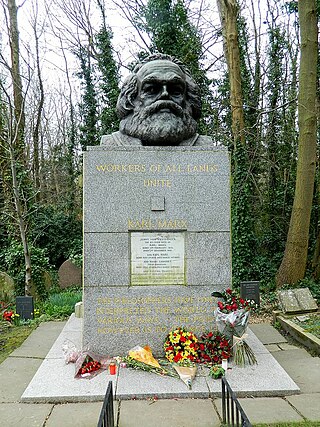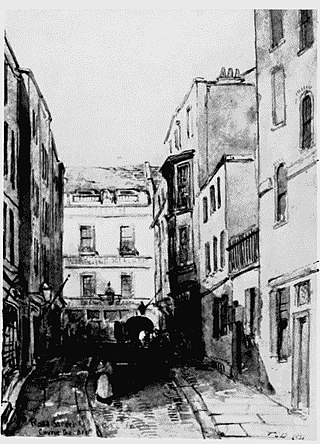Anarchism is a political philosophy and movement that is skeptical of all justifications for authority and seeks to abolish the institutions it claims maintain unnecessary coercion and hierarchy, typically including nation-states, and capitalism. Anarchism advocates for the replacement of the state with stateless societies and voluntary free associations. As a historically left-wing movement, this reading of anarchism is placed on the farthest left of the political spectrum, usually described as the libertarian wing of the socialist movement.

Annie Besant was a British socialist, theosophist, freemason, women's rights and Home Rule activist, educationist, and campaigner for Indian nationalism. She was an ardent supporter of both Irish and Indian self-rule. She became the first female president of the Indian National Congress in 1917.

Charles Bradlaugh was an English political activist and atheist. He founded the National Secular Society in 1866, 15 years after George Holyoake had coined the term "secularism" in 1851.

Anarchism in the United Kingdom initially developed within the religious dissent movement that began after the Protestant Reformation. Anarchism was first seen among the radical republican elements of the English Civil War and following the Stuart Restoration grew within the fringes of radical Whiggery. The Whig politician Edmund Burke was the first to expound anarchist ideas, which developed as a tendency that influenced the political philosophy of William Godwin, who became the first modern proponent of anarchism with the release of his 1793 book Enquiry Concerning Political Justice.

The Jura Federation represented the anarchist, Bakuninist faction of the First International during the anti-statist split from the organization. Jura, a Swiss area, was known for its watchmaker artisans in La Chaux-de-Fonds, who shared anti-state, egalitarian views on work and social emancipation. The Jura Federation formed between international socialist congresses in 1869 and 1871. When the First International's General Council, led by Marxists, suppressed the Bakuninists, the Jura Federation organized an international of the disaffected federations at the 1872 St. Imier Congress. The congress disavowed the General Council's authoritarian consolidation of power and planning as an affront to the International's loose, federalist founding to support workers' emancipation. Members of the First International agreed and even statists joined the anti-statists' resulting Anti-authoritarian International, but by 1876, the alliance had mostly dissolved. While in decline, the Jura Federation remained the home of Bakuninists whose figures engaged on a two-decade debate on the merits of propaganda of the deed. The egalitarian relations of the Jura Federation had played an important role in Peter Kropotkin's adoption of anarchism, who became the anarchist standard-bearer after Bakunin.
Mark Bevir is a British philosopher of history. He is a professor of political science and the Director of the Center for British Studies at the University of California, Berkeley, where he currently teaches courses on political theory and philosophy, public policy and organisation, and methodology. He is also a Professor in the Graduate School of Governance, United Nations University (MERIT) and a Distinguished Research Professor in the College of Arts and Humanities, Swansea University.
The Labour Emancipation League was a socialist organisation in London.
Ambrose Barker was a British anarchist activist.
The National Reformer was a secularist weekly publication in 19th-century Britain (1860–1893), noted for providing a longstanding "strong, radical voice" in its time, advocating atheism. Under the editorship of Charles Bradlaugh for the majority of its lifespan, each issue stated that "The editorial policy of the Paper is Republican, Atheistic, and Malthusian, but all opinions are freely admitted, provided only that they be expressed reasonably and in proper language."
State socialism is a political and economic ideology within the socialist movement that advocates state ownership of the means of production. This is intended either as a temporary measure, or as a characteristic of socialism in the transition from the capitalist to the socialist mode of production or to a communist society. State socialism was first theorised by Ferdinand Lassalle. It advocates a planned economy controlled by the state in which all industries and natural resources are state-owned.
Eco-socialism is an ideology merging aspects of socialism with that of green politics, ecology and alter-globalization or anti-globalization. Eco-socialists generally believe that the expansion of the capitalist system is the cause of social exclusion, poverty, war and environmental degradation through globalization and imperialism, under the supervision of repressive states and transnational structures.
Harriet Teresa Law was a leading British freethinker in 19th-century London.
Marie Le Compte was an American journal editor and anarchist who was active during the early 1880s.
Ethical socialism is a political philosophy that appeals to socialism on ethical and moral grounds as opposed to consumeristic, economic, and egoistic grounds. It emphasizes the need for a morally conscious economy based upon the principles of altruism, cooperation, and social justice while opposing possessive individualism.

Utopian socialism is the term often used to describe the first current of modern socialism and socialist thought as exemplified by the work of Henri de Saint-Simon, Charles Fourier, Étienne Cabet, and Robert Owen. Utopian socialism is often described as the presentation of visions and outlines for imaginary or futuristic ideal societies, with positive ideals being the main reason for moving society in such a direction. Later socialists and critics of utopian socialism viewed utopian socialism as not being grounded in actual material conditions of existing society. These visions of ideal societies competed with revolutionary and social democratic movements.
Frank Kitz was an English anarchist.

Far-left politics in the United Kingdom have existed since at least the 1840s, with the formation of various organisations following ideologies such as Marxism, revolutionary socialism, communism, anarchism and syndicalism.

The Rose Street Club was a far-left, anarchist organisation based in what is now Manette Street, London. Originally centred around London's German community, and acting as a meeting point for new immigrants, it became one of the leading radical clubs of Victorian London in the late-nineteenth century. Although its roots went back to the 1840s, it was properly formed in 1877 by members of a German émigré workers' education group, which soon became frequented by London radicals, and within a few years had led to the formation of similar clubs, sometimes in support and sometimes in rivalry. The Rose Street Club provided a platform for the radical speakers and agitators of the day and produced its own paper, Freiheit—which was distributed over Europe, and especially Germany—and pamphlets for other groups and individuals. Although radical, the club initially focused as much on providing a social service to its members as on activism. With the arrival of the anarchist Johann Most in London in the early 1880s, and his increasing influence within the club, it became increasingly aligned with anarchism.
Anarchism and libertarianism, as broad political ideologies with manifold historical and contemporary meanings, have contested definitions. Their adherents have a pluralistic and overlapping tradition that makes precise definition of the political ideology difficult or impossible, compounded by a lack of common features, differing priorities of subgroups, lack of academic acceptance, and contentious historical usage.

Robert Joseph Forder was an English freethinker, radical, publisher and bookseller and birth controller. He was particularly associated with the career of Charles Bradlaugh and the National Secular Society.








